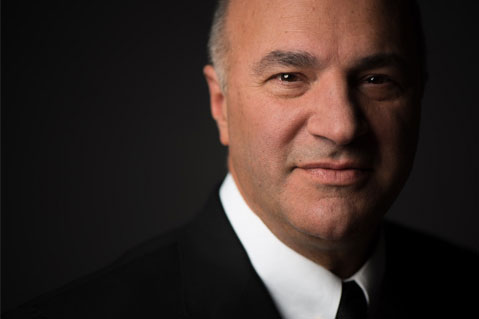January 04, 2018
Kevin O’Leary Impresses in ASI Orlando Keynote
The ASI Show Orlando was a few miles from Sea World, but that didn’t stop a certain shark from taking the stage on Thursday. Kevin O’Leary of ABC’s Shark Tank discussed the biggest challenges entrepreneurs face when growing their business, offering tips, tricks and brutally honest advice to a sea of laser-focused suppliers and distributors.
O’Leary, affectionately referred to as Mr. Wonderful, opened the keynote speech with a video of one of the most unique Shark Tank cases. In it, Benjilock founder Robbie Cabral asked the sharks to invest in his patent for fingerprint padlock technology. He had neither a company nor distribution, just a patented product and passion to make it succeed.
“If you have a better mousetrap, it doesn’t mean you’ll be wealthy, but you could disrupt the market and one day be wealthy,” O’Leary said.

The chairman of O’Shares Investments and O’Leary Ventures shared the three common attributes found in every successful pitch: articulating the opportunity in 90 seconds or less, convincing investors that they are the right team to execute the plan, and knowing the numbers. One of the most important numbers he listens for during a pitch is the cost of customer acquisition. For companies who make it to Shark Tank, he says there is no cost – about 4 million viewers see the episode when it premieres, and roughly 6 million watch it in syndicated reruns.
Obviously, not every company is that lucky. That’s why he praises social media – it’s free customer acquisition. “The number-one social media platform for achieving ROI in 2017 was LinkedIn,” O’Leary said. “It lets you tell a story, supports full video and allows you to communicate directly with your customers on a professional platform.”
ROI means everything to Mr. Wonderful, who discovered that all of his returns came from companies run by women. “I’m not trying to start gender warfare,” O’Leary cautioned. “I’d give my money to a goat if I could get a return.”
He studied those female-led companies and compared their business practices with their male counterparts. The women had better time management skills, set achievable goals, maintained culture that had less employee turnover and successfully assimilated feedback. “When you achieve your goals consistently, it changes the culture of the company,” O’Leary said. “People want to play for a winning team.”
He also shared a couple tips from his women business leaders with the audience. First, every night before bed, write down three things you have to do first thing in the morning on a note pad and leave it on your nightstand. When you wake up, before you check your emails, turn on the TV or anything else, make sure you do those three things.
Secondly, you should get two phones: one for your business and customers, and the other for your family. Tell your customers that if they ever have a problem with your product, service or company, they can call you. “I don’t want to hear how much you like something, just when you have a problem,” O’Leary said. “When you give direct access to your world, it’s a sign of respect. They won’t call you unless they really need you, and then you know it’s something very important.”
After his keynote speech, O’Leary participated in a Q&A with ASI President and CEO Tim Andrews, fielding questions from the audience regarding when to add business partners, how to evaluate them and the importance of honesty.
“The number-one rule for running a business is don’t lie,” O’Leary said. “Truth is a tremendous magnet. People say I’m the mean shark, but have you ever seen me lie? People that tell the truth get in trouble, but they stay in business forever.”
